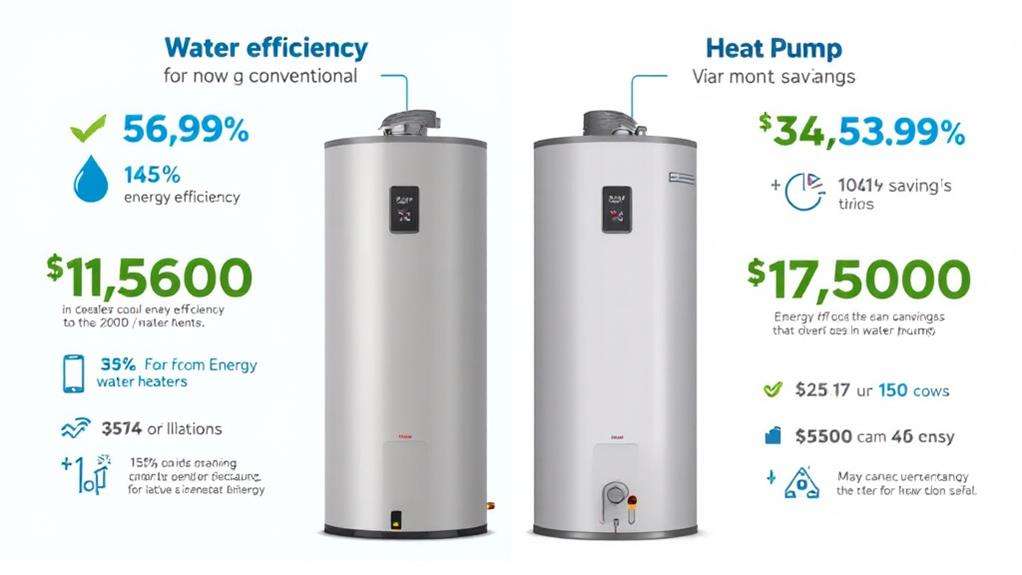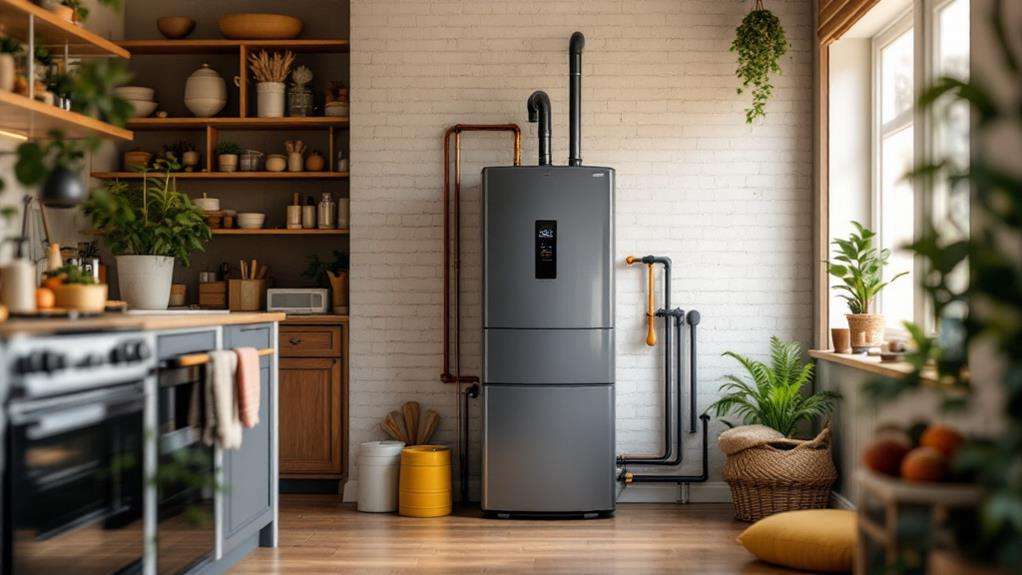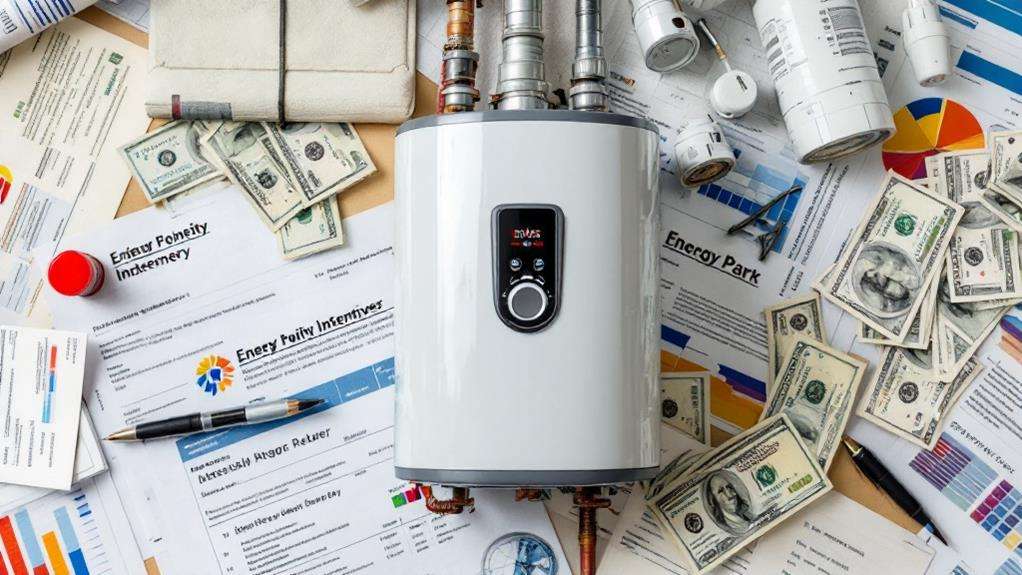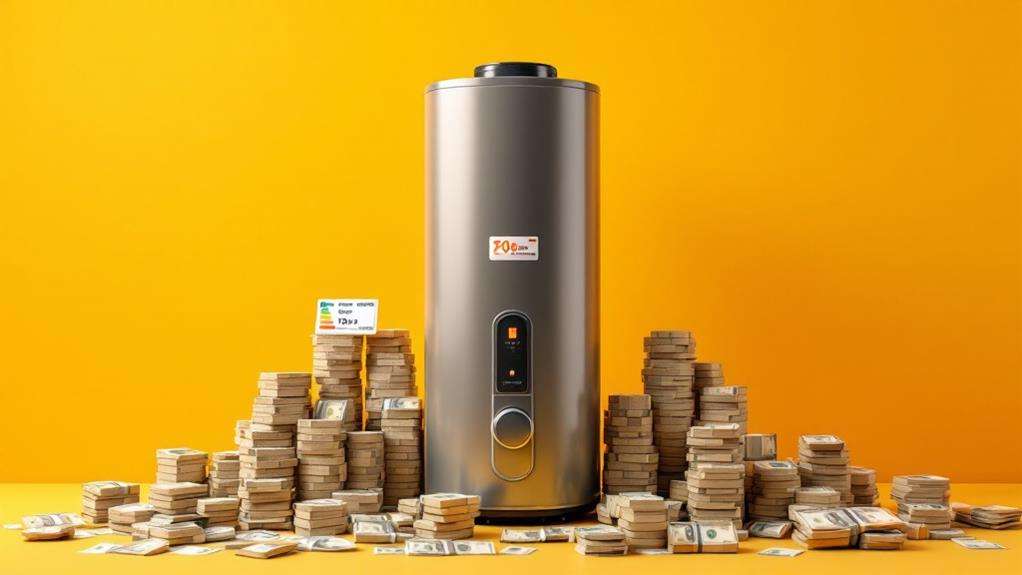Heat Pump Water Heaters: How They Save Energy and Money
If you're looking to save energy and money on hot water, heat pump water heaters are the way to go. They use advanced refrigeration to transfer heat from the air into the water, slashing your energy use by up to 70% compared to standard water heaters. This translates to significantly lower utility bills and a smaller carbon footprint. Plus, the long-term savings can offset the slightly higher upfront cost. To learn more about how these efficient appliances work and the benefits they offer, keep reading.
Key Takeaways
- Heat pump water heaters use refrigerant technology to absorb heat from the air and transfer it to the water, resulting in 50-70% less energy consumption compared to traditional electric or gas-powered water heaters.
- The higher energy efficiency of heat pump water heaters can lead to substantial savings on utility bills, with a payback period of 2-4 years, making them a wise long-term investment.
- Heat pump water heaters have a longer lifespan of 10-15 years due to fewer moving parts and lower operating temperatures, further contributing to their cost-effectiveness.
- Proper installation and regular maintenance, such as cleaning air filters and checking the condensate drain, are crucial for ensuring optimal performance and maximum energy savings.
- Heat pump water heaters have a smaller carbon footprint and are a more environmentally friendly choice, reducing greenhouse gas emissions and conserving natural resources.
Understanding Heat Pump Technology
Heat pump technology is the foundation upon which heat pump water heaters operate. These systems work by reversing the typical heat transfer process, moving heat from one place to another instead of generating it directly. They use a refrigerant composition that absorbs heat from the surrounding air and transfers it to the water in the storage tank. This process is much more efficient than traditional electric or gas-powered water heaters, which must generate heat from scratch.
The refrigerant circulates through the heat pump, absorbing heat energy. A compressor then concentrates this thermal energy, allowing it to be easily transferred to the water. This cycle continues, extracting heat from the air and delivering it to the water tank. By leveraging the natural flow of heat, heat pump water heaters can provide the same hot water while using significantly less energy than conventional models. Understanding this underlying technology is key to appreciating the energy and cost savings of these innovative water heating systems.
Benefits of Heat Pump Efficiency
Efficiency is the defining advantage of heat pump water heaters. These innovative systems don't generate heat directly; instead, they move heat from the surrounding air into the water, using significantly less electricity than traditional electric or gas water heaters. This improved system performance translates to reduced operating costs, making heat pump water heaters a smart investment for your home.
Here are three key benefits of their efficient design:
- Lower utility bills: Heat pump water heaters can be up to 3 times more energy-efficient than standard electric water heaters, slashing your monthly energy costs.
- Reduced environmental impact: By consuming less electricity, heat pump water heaters have a smaller carbon footprint, making them a more eco-friendly choice.
- Longer lifespan: With fewer moving parts and lower operating temperatures, heat pump water heaters often outlast conventional water heaters, providing years of reliable hot water.
The efficiency of heat pump technology is undoubtedly the standout feature, delivering substantial savings on your energy bills and environmental impact.
Comparing Energy Savings

Comparing the energy savings of heat pump water heaters to traditional models can make a compelling case for the investment. Traditional electric or gas water heaters typically have much higher operating costs, consuming significantly more energy to heat the same amount of water. In contrast, heat pump water heaters use 50-70% less energy, translating to substantial savings on your monthly utility bills.
The payback period for a heat pump water heater is usually 2-4 years, depending on your local electricity rates and hot water usage. After this initial investment, you'll continue to enjoy the benefits of lower energy costs for the remainder of the unit's 10-15 year lifespan. When factoring in the lifetime savings, the upfront cost premium becomes a smart long-term decision. Given the impressive energy efficiency and cost-effectiveness, upgrading to a heat pump water heater is a wise choice that pays dividends over time.
Installation and Maintenance
Properly installing a heat pump water heater is crucial to ensuring optimal performance and energy savings. You'll need to follow the manufacturer's instructions carefully, ensuring the unit is placed in a well-ventilated area with proper clearance for airflow.
To maintain your heat pump water heater, keep these tips in mind:
- Regularly clean the air filters: Over time, the filters can become clogged with dust and debris, reducing airflow and efficiency. Plan to clean the filters every 3-6 months to keep your system running at its best.
- Check the condensate drain: Make sure the condensate drain line is clear and properly sloped to allow water to flow away from the unit. A blocked or improperly installed drain can lead to water damage.
- Schedule professional maintenance: Once a year, have a qualified technician inspect and service your heat pump water heater to catch any issues before they become major problems.
Sizing Considerations

Selecting the right size heat pump water heater is crucial for maximizing its performance and energy efficiency. The unit sizing depends on your household's hot water demand, which is influenced by the number of occupants and their water usage habits. To size the heat pump correctly, consider the recommended tank capacity based on the number of bedrooms in your home. Typically, a 40-50 gallon tank is suitable for 1-2 bedrooms, while a 50-80 gallon tank works better for 3-4 bedrooms.
Additionally, the location selection plays a significant role. Heat pump water heaters operate most efficiently in warmer, humid environments like a basement or garage. Avoid placing the unit in cold spaces, as it'll have to work harder to heat the water. Ensure adequate airflow around the unit and consider noise levels if locating it near living areas. By carefully selecting the right size and placement, you'll enjoy maximum energy savings and hot water comfort.
Replacing Traditional Water Heaters
Replacing a traditional water heater with a heat pump model can provide significant energy and cost savings over the long run. When considering a replacement, it's essential to evaluate your current fuel type and explore the potential benefits of upgrading to a more energy-efficient option.
Here are three key factors to consider when replacing a traditional water heater:
- Fuel Type Selection: Heat pump water heaters are highly efficient, often delivering 2-3 times the energy efficiency of traditional electric or gas-fired models. This can translate to substantial savings on your utility bills.
- Energy Efficiency Upgrades: Opting for a heat pump water heater can qualify you for various rebates and incentives, helping offset the initial cost and making the upgrade more financially accessible.
- Long-Term Cost Savings: While the upfront investment may be higher, the energy savings achieved over the lifespan of a heat pump water heater can more than make up for the difference, resulting in significant long-term cost savings.
Incentives and Rebates

When replacing your traditional water heater with a heat pump model, you'll be pleased to find that there are various incentives and rebates available to help offset the initial cost. Many utility companies offer generous programs that provide cash rebates or tax credits to homeowners who upgrade to an energy-efficient heat pump water heater. These utility-based incentives can significantly reduce the upfront investment, making the switch more affordable.
Additionally, government incentives, such as federal tax credits and state-level rebates, are often available to further boost the savings. It's important to research the specific programs in your area, as eligibility and the amount of the incentives can vary. By taking advantage of these financial incentives, you can enjoy the long-term energy and cost savings of a heat pump water heater while minimizing the upfront expenses.
Environmental Impact
By making the switch to a heat pump water heater, you can significantly reduce your household's environmental impact. These energy-efficient appliances not only save you money on utility bills but also contribute to a more sustainable future.
The environmental benefits of using a heat pump water heater are numerous:
- Reducing carbon footprint: Heat pump water heaters consume up to 60% less energy compared to traditional electric or gas water heaters, resulting in a substantial reduction in your household's carbon emissions.
- Sustainable energy usage: Heat pump water heaters utilize renewable energy sources, such as the heat from the surrounding air, making them a more sustainable choice for your hot water needs.
- Conserving natural resources: By reducing your energy consumption, you're directly contributing to the conservation of natural resources, such as fossil fuels, and promoting a greener future.
Balancing Upfront Costs

While the environmental benefits of heat pump water heaters are compelling, the upfront costs can be a concern for some homeowners. However, it's important to consider the long-term savings and payback period. Compared to traditional water heaters, heat pump models have a higher initial investment, but they can offset this with significantly lower energy bills over time.
The payback period for a heat pump water heater typically ranges from 3 to 7 years, depending on factors like electricity rates and usage. After that, you'll continue to save money every month on your utility bills. Additionally, heat pump water heaters have a longer lifespan, often 10-15 years, compared to conventional models. This means you'll need to replace them less frequently, further reducing your overall replacement costs.
When evaluating the upfront costs, factor in the long-term benefits and the potential for substantial energy savings. The initial investment may be higher, but the energy efficiency and extended lifespan of a heat pump water heater can make it a wise choice for your home.
Frequently Asked Questions
Heat pump water heater buyers often have several common questions. Let's address a few of the most frequent ones.
What are some common misconceptions about heat pump water heaters? First, many people think they won't work in colder climates, but modern models can perform well even in temperatures as low as 40°F. Second, some believe they're noisy, but today's models are designed to be much quieter. Finally, there's a misconception that they're expensive, but the energy savings can often offset the higher upfront cost.
How do typical usage patterns impact performance? Heat pump water heaters work best when the water heater is used regularly. If the water heater sits idle for long periods, the efficiency may drop. Additionally, placing the unit in a warm, well-ventilated space will help it perform at its best.
